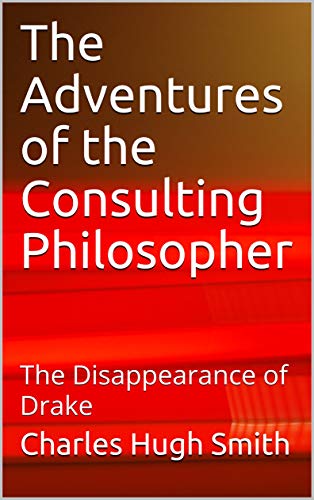Summary:
This is the politics of decline and collapse. The unspoken assumption of the modern era is that politics can fix whatever is broken: whatever is broken in society or the economy can be fixed by some political policy or political process– becoming more inclusionary, seeking non-partisan middle ground, etc. What if this assumption is flat-out wrong? What is politics is incapable of fixing what’s broken? What if politics merely fosters an illusion of solutions, a paper-thin veneer of faux progress? What if politics isn’t a tool that’s capable of fixing what’s broken? What if all politics is able to do is generate delusions of grandeur and unresolvable conflicts? What if politics is ultimately little more than a fatal
Topics:
Charles Hugh Smith considers the following as important: 5) Global Macro, Featured, newsletter, The United States
This could be interesting, too:
This is the politics of decline and collapse. The unspoken assumption of the modern era is that politics can fix whatever is broken: whatever is broken in society or the economy can be fixed by some political policy or political process– becoming more inclusionary, seeking non-partisan middle ground, etc. What if this assumption is flat-out wrong? What is politics is incapable of fixing what’s broken? What if politics merely fosters an illusion of solutions, a paper-thin veneer of faux progress? What if politics isn’t a tool that’s capable of fixing what’s broken? What if all politics is able to do is generate delusions of grandeur and unresolvable conflicts? What if politics is ultimately little more than a fatal
Topics:
Charles Hugh Smith considers the following as important: 5) Global Macro, Featured, newsletter, The United States
This could be interesting, too:
Nachrichten Ticker - www.finanzen.ch writes Die Performance der Kryptowährungen in KW 9: Das hat sich bei Bitcoin, Ether & Co. getan
Nachrichten Ticker - www.finanzen.ch writes Wer verbirgt sich hinter der Ethereum-Technologie?
Martin Hartmann writes Eine Analyse nach den Lehren von Milton Friedman
Marc Chandler writes March 2025 Monthly
This is the politics of decline and collapse.
The unspoken assumption of the modern era is that politics can fix whatever is broken: whatever is broken in society or the economy can be fixed by some political policy or political process– becoming more inclusionary, seeking non-partisan middle ground, etc.
What if this assumption is flat-out wrong? What is politics is incapable of fixing what’s broken? What if politics merely fosters an illusion of solutions, a paper-thin veneer of faux progress? What if politics isn’t a tool that’s capable of fixing what’s broken? What if all politics is able to do is generate delusions of grandeur and unresolvable conflicts? What if politics is ultimately little more than a fatal distraction?
This is of course heresy of the highest order, for a belief in the supremacy of politics is the secular religion of our era. The orthodoxy is: there is no problem that can’t be solved with a political policy: a tax cut, a new tax, a new incentive, a broader definition of criminality, and so on.
What if the status quo is failing for reasons that are beyond the reach of politics? Politics assumes that tweaking incentives and disincentives via rewards and punishments, centralizing control of assets and income streams and manipulating the issuance of currency and interest rates can fix any and every problem.
The limits of politics are the limits of government. In the present era, all government seeks to further centralize power and capital because the era’s quasi-religious belief is that centralization is the solution to everything.
This is of course false. Centralization works until it becomes the problem, at which point further centralization of power and capital only speeds system-wide failure.
Government can force certain things but it can’t force everything. Government can encourage borrowing but it can’t force its citizens to borrow. Government can force the expansion of currency, but it can’t force the valuation of that currency.
Government can mandate this and that, but it can’t force a negative return on investment (ROI) to magically become positive. Government can prohibit and tax and force outward compliance, but it can’t force people to agree with policies that run counter to their beliefs.
Government can’t rescue a status quo which is failing due to negative return on investment (ROI), gross inefficiencies, the loss of trust in corrupt institutions , and all the other ills that are intrinsic to centralization of power and capital.
As a result, the greater the government’s power, the greater the polarization as the self-serving elites seek to protect their share of the pie as the pie shrinks. Each camp becomes increasingly extreme, and compromise is recognized as a process that erodes every camp’s power and income.
| The political solution is take-no-prisoners domination and the eradication of rivals’ power to veto or contest the domination of the winner. This drive to polarization is the result of centralized elites attempting to distribute the system’s increasing failure to their competing elites.
This is the politics of decline and collapse. This is the only possible output of centralized power grabs by self-serving elites, i.e. the status quo. |
Political Polarization Has Exploded Since 2000 |
My new book is The Adventures of the Consulting Philosopher: The Disappearance of Drake. For more, please visit the book's website.
Tags: Featured,newsletter


